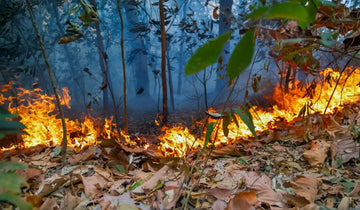The Amazon is burning and no one cares
by Baia Food on Aug 22, 2019
Tabla de contenidos
The Amazon rainforest, one of the most important lungs of our Planet, has been burning for more than 15 days and there has been no coverage in the media.
Strange right? And then they will say what is this about climate change.
We have to stop this now. The consequences are fatal. Are we really so blind that we don't see what's happening? Or do we prefer to look elsewhere? To stop all this, we first have to understand why these fires occur, and what deforestation is, and what the direct consequences are on the Earth.
DEFORESTATION:
According to Wikipedia, "deforestation or felling of trees is a process generally caused by human action, in which the forest surface is destroyed."
Deforestation devastates the forests and jungles of our planet on a massive scale. To the point that tropical forests and rainforests could disappear completely within 100 years if the current frenetic pace continues.
THE MOTIVES:
In case you didn't know, deforestation is directly caused by man , it is us humans who cut down or burn forests. This is reality, no unprovoked fires. Do not be fooled.
The reasons for indiscriminate logging are many, but most are related to the commercial interests of agriculture . Farmers clear forests in order to obtain more space for their crops (mainly soybeans, palm and cocoa) or for grazing their livestock. Companies that sell paper and lumber also participate in clearing down countless forests each year. Last but not least, forests and jungles also fall victim to constant urban growth.

Image: National Geographic
CONSEQUENCES:
Deforestation has many negative consequences for the environment.
a) The loss of habitat for millions of species. About 70% of animals and plants live in the jungles and forests of the Earth. Many of them cannot survive this phenomenon, since their environment is completely altered and destroyed. They can no longer feed themselves, and therefore the survival of their species is put in extreme danger. The best-known example, but not the only one, is that of orangutans in Indonesia, where even these animals have come to stand up to humans by confronting bulldozers.
b) Deforestation directly affects climate change. The soils of the jungles are humid. Without trees and their shade, forests dry out quickly. In addition, trees also help perpetuate the hydrological cycle by returning water vapor to the atmosphere. The consequence is that many jungles and forests can quickly become arid deserts.
c) More extreme temperature changes. The elimination of the vegetation layer and therefore of the tree protection that blocks the sun's rays during the day and maintains heat at night contributes to the appearance of more extreme temperature changes that are harmful to plants and animals.d) Greater emission of greenhouse gases. Trees play a crucial role in absorbing greenhouse gases that are responsible for global warming. Having fewer jungles and forests means emitting more greenhouse gases into the atmosphere and a greater speed in the advance of climate change.
SOLUTION:
The first thing of all is to become aware of the problem . Many of us look the other way, but we all know that that is not the solution to any of the problems in this life.a) The first thing you can do is spread the word. That is, talk about the topic. Many people may not be aware of the situation. Get informed and share your knowledge.
b) Consume responsibly. The main reason for deforestation and fires in the Amazon (and many other areas) is that we continue to buy their soy, palm oil, meat or wood. Reduce your meat consumption and try to buy organic (local) products.
c) Protest against governments. Europe, the US and China are the main importers of all these products. Press to restrict such imports and promote those of sustainable crops.d) Contribute to international organizations and NGOs that work directly in the affected areas. These organizations work closely with local communities threatened and affected by the fire, while lobbying for things to change.










